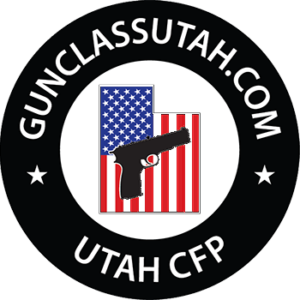Many want to know and often ask in my Utah Concealed Carry Classes, “When is it legal for me to draw a gun against an aggressor in self defense? The short answer is and cops will most likely answer; “when you are in fear of your life”. Sounds simple and is what most instructor’s teach, or what a google search result says but it does little in bringing comfort to the person asking the question. Those asking the question fear going to jail for making the wrong decision and for good reason; drawing a gun on someone should be a last resort BUT hesitating out of fear of legal consequences can get you killed! Only YOU can make that decision!
I can not give legal advice, talk to an experienced criminal defense attorney if in doubt when you can legally draw a gun on someone in self defense. This article is written for what (I) would do if faced in a situation like this.
I have been a Utah law enforcement officer for over twenty six years. I served about eighteen of those years in patrol, so I have investigated hundreds, (if not more) self defense cases as a street cop. I can not recall ONE instance where someone minding their own business, was ever charged with a crime for drawing a gun in self defense. If a prosecutor finds that you unlawfully drew your gun on another individual, you may face one or both charges of either Brandishing 76-10-506, (Class A misdemeanor) or worse Aggravated Assault 76-5-103. If you follow these tips, it will be extremely difficult for a prosecutor to convict you of a crime when acting in lawful self defense.
Utah 76.2.402 (Force in Defense of Persons)
First of all, if you draw a gun while acting in self defense, it helps when you are minding your business and are not perceived as either looking for trouble, or perceived as contributing to the problem. Being a mutual in road rage is just one example. You have to “lawfully” be in a place where you have a right to be, You can not provoke situations with intent to cause bodily injury either. Also, you can not be involved in a felony criminal activity, either or all of these will likely result in you being found by a judge “unjustified” under law. When acting in self defense, a threat has to be “imminent” and “unlawful.” If your aggressor effectively communicates they want to withdraw from their encounter with you, then you must STOP your actions as well. For all reasons here minding your own business is crucial. You do NOT have a duty to retreat, in other words you can STAND YOUR GROUND against your attacker. If a tactical retreat would benefit YOU and can be done without creating more risk of harm, why not do that? For example if someone approached you aggressively with a knife, walking backwards and you tripping and falling would NOT be a good idea.
Very important: If you find yourself drawing a gun on an aggressor, DO NOT point the gun at them unless you have made the mental decision to pull the trigger. When drawing, do so at a “Low ready” (pointed at the ground) position, it looks less aggressive and is a defensive posture. Pointing a gun at someone when you are not justified only gives a prosecutor ammunition to charge you for aggravated assault because pointing the gun at someone creates a risk of bodily injury, (an element to aggravated assault). I arrested a Utah CCW holder once that initiated a road rage over a conflict over a parking stall which resulted in the CCW holder (pointing) his gun at the person he contacted. The CCW holder that pointed the gun at the other person was the deciding factor in which I arrested him for Aggravated Assault; the prosecutor later agreed that charge was appropriate. The CCW holder had his permit revoked.
DO NOT make threats to your aggressor, unless absolutely necessary, you can give commands to stop without making threats. Threats are necessary elements to the crime of aggravated assault and brandishing useful to a prosecutor so don’t make them. AVOID being perceived as ANGRY and threatening to the aggressor when you have drawn your gun on them. You can tell the aggressor to stop without making threats, there is a difference!
DO give verbal commands to your aggressor, if feasible to stop their aggression. Verbal commands may de-escalate the situation, it shows YOU are in control of that encounter. If you find yourself drawing a gun on an aggressor, YOU be the first to call in and report their actions that led you to take immediate action. Keep your statements brief to police, for example limited to identifying yourself AND that aggressor’s actions caused you fear for your life. If the officer needs further information that may incriminate you, tell them you will cooperate with further statements through your attorney and HIRE one, it’s worth the money. You wouldn’t do your own medical procedures, same applies here when your are facing potential jail time.
Mindset: If you find yourself in a position where you feel that you must draw a gun in self defense, be prepared for that aggressor to try and take that gun away from you and use it against you! If you are not prepared to pull the trigger when necessary, you are creating a risk to yourself. Train on your firearm and know how to use it well, this includes clearing malfunctions. Carrying comfortably is a necessary mindset learned through a good instructor. When you feel comfortable with laws of self defense, carrying that gun daily and knowing how to use it well if very empowering. Take the necessary time to get the proper training, it may save your life!
Justification Hearing:
If this occurs in Florida or Utah and a prosecutor wants to prosecute you for a crime. You can motion the court for a self defense justification hearing. Under Utah law 76-2-309 effective (May 2021). Florida and Utah are the only states with this privilege. If you request the hearing, a prosecutor, (not you) have the burden of showing a Judge that you actions were not self defense. If that prosecutor can not convince the Judge with clear and convincing evidence, they must stop all prosecution against you and can not be later filed, it’s DONE. Exceptions; If your self defense case involves a police officer, or is a crime of domestic violence, you can’t have a hearing. Follow all of these tips and your chances are very slim a prosecutor will be successful in prosecuting you for a crime.
Phil Snyder, (Retired) Unified Police Officer of Salt Lake City, Utah
Utah BCI Concealed Firearms Instructor

